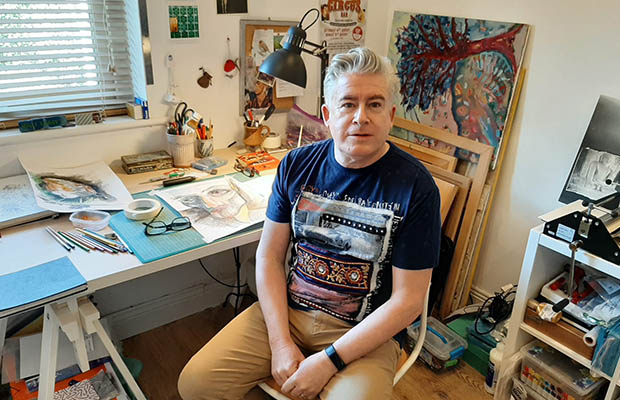Undoubtedly, there have been many different innovations in the technology sector over the years. Artificial intelligence has proven to be incredibly effective in a variety of settings. It reduced human effort by automating a sizable portion of the workforce, and it has everyone convinced that there is still more automation to come.
It’s hard to imagine life without artificial intelligence because it has permeated every aspect of our daily lives. Do you know who is the father of artificial intelligence?
Geniuses do not always have it easy when it comes to history. When John McCarthy (1927-2011) was born in Little seemed to indicate that this young prodigy would become a deserving successor to Alan Turing when he was born in Boston on the eve of the Great Recession to a modest family of European immigrants.
Continue reading and you will learn more about John McCarthy and artificial intelligence!

Table of Contents
The Origin Of The Term “Artificial Intelligence”
John McCarthy, a pioneering American computer scientist, and inventor earned the title “Father of Artificial Intelligence” after significantly contributing to the definition of the field devoted to the development of intelligent machines.” The cognitive scientist first used the term in his 1955 proposal for the 1956 Dartmouth Conference, the first artificial intelligence conference. The goal was to figure out a way to build a machine that could think abstractly, solve issues, and grow just like a human. “In theory, every aspect of learning or any other aspect of intelligence can be described in such detail that a machine can simulate it, he asserted.
Father Of Artificial Intelligence
The man known as the Father of Artificial Intelligence, John McCarthy, was a pioneer in the field. The term “artificial intelligence” was also coined by him, and he is recognized as the creator of AI.
Who Was John Mccarthy?
John McCarthy was a renowned computer scientist as well as a cognitive scientist and is regarded as the father of AI.
McCarthy gave a conference on the Dartmouth College campus in the summer of 1956 where he gave his definition of artificial intelligence, marking the beginning of AI research. The conference attendees, including McCarthy, went on to lead AI research for many years.
McCarthy is also credited with creating Lisp, a programming language widely used in robotics, other scientific applications, and a variety of web-based services, including airline scheduling and the detection of credit card fraud.
McCarthy established an AI lab at Stanford University, where he worked on early prototypes of a self-driving car. He wrote papers on “robot consciousness” and “free will” and worked on ways to better make software understand or mimic human common sense decision-making.
Another significant McCarthy invention was an early form of computer networking that enabled many users to share data by connecting to the single computer. In 1960, McCarthy stated the fundamental idea of cloud computing when he expressed his opinion that “computation may someday be organized as a public utility.”
In 1966, the father of AI got the world’s attention when he hosted a series of four simultaneous computer chess matches carried out via telegraph against rivals in McCarthy lost two matches and drew two over the course of several months in Russia.
John Mccarthy’s Big Achievements In AI
The definition of artificial intelligence by John McCarthy outlined the direction in which the subject should go as a field of study. In 1959, Marvin Minsky joined him at MIT, where McCarthy was a research fellow.
Following his quest to build machines that could mimic human logical thinking, his next breakthrough came when he proposed the Advice Taker in 1958 in his paper ‘programs with common sense. This was a made-up computer program that aimed to use logic to represent data on a computer. This was also the first step in introducing the idea of enhancing artificial intelligence through logical reasoning.
McCarthy went on to create LISP, which is still regarded as the best programming language in the field of artificial intelligence, during the same time period. Around the 1950s or 1960s, John McCarthy also made heads turn with his absurd idea of time-sharing. His idea of storing everything on a single computer and sharing it with other systems could be considered a precursor to the cloud-based storage we use today.
There are three major earliest time-sharing systems that are largely credited to John McCarthy –
- Compatible Time-sharing System
- BBN Time-sharing system
- Dartmouth Time-Sharing System
Le Earnest, a colleague of his at the time, had remarked that if John McCarthy hadn’t developed time-sharing systems, the internet wouldn’t have materialized so quickly. He explained how new names for this over time—servers initially, and then cloud computing—appeared.
Other Leaders In Artificial Intelligence
John McCarthy belonged to a distinguished group of scientists who, in one way or another, were all largely responsible for the development of artificial intelligence. Most, but not all, of his contemporaries participated in the renowned Dartmouth Conference in 1956. We’ll examine some of the other significant AI players.
Alan Turing
Turing, an English mathematician, computer scientist, cryptanalyst, logician, and theoretical biologist, was influential in the advancement of theoretical computer science before the Dartmouth Conference.
The ideas of algorithm and computation that gave rise to general-purpose computers were provided by his Turing machine. He is also regarded as a founding father of artificial intelligence, though his contributions were never fully appreciated at the time due to the Official Secrets Act’s requirement for confidentiality and the pervasive homophobia of the day, which ultimately resulted in his prosecution and suicide in 1954.
TheTuring Award is the highest distinction in computer science and is named after him.
Geoffrey Hinton
Alongside Yoshua Bengio and Yann LeCun, One of the “Godfathers of AI” is often referred to as Geoff Hinton.
Although his contributions are much more recent than John McCarthy’s, they are nonetheless significant because of his work on artificial neural networks, which has earned him and his contemporaries the moniker “the fathers of Deep Learning.”
Marvin Minsky
A member of the Dartmouth Conference, Minsky was a cognitive and computer scientist who worked with John McCarthy and co-founded the MIT AI laboratory in 1959.
On artificial neural networks and artificial intelligence, he produced important research. In 1969, he was given the Turing Award.
Allen Newell
Also present at Dartmouth, Newell’s contributions to AI included the Information Processing Language in 1956, and two of the earliest AI programs, the Logic Theory Machine and the General Problem Solver with his colleague Herbert S. Simon. Both were Turing Award winners in 1975.
Claude Shannon
The Dartmouth Conference was planned with assistance from the father of information theory. His paper “A Mathematical Theory of Communication” and subsequent research have been a fundamental contribution to natural language processing and computational linguistics.
Nathaniel Rochester
In addition to designing IBM’s first commercial computer, the IBM 701, and writing the first assembler that made it possible to write programs in brief comments rather than numbers, Rochester is renowned for his research on pattern recognition and intelligent machines. He also organized the Dartmouth Conference.




